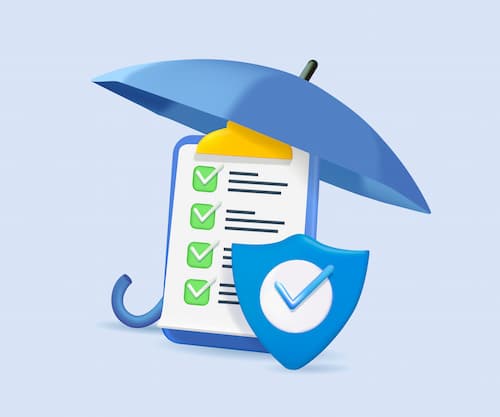What is renters insurance?
Renters insurance is a home insurance policy that protects tenants and their property. Renters insurance covers your personal property when you are living in a rental house or apartment. It also provides liability coverage. Renters insurance exists to protect you because your landlord's policy doesn't.
How renters insurance works and what it covers
Like a home insurance policy, renters insurance works by setting a coverage amount to protect your personal property. There are a list of covered perils included in the policy, and it will pay out to replace or repair your items if they're damaged by any covered peril.
Renters insurance covers:
- Your personal property. This coverage extends anywhere in the world, with some limitations.
- Personal liability. This protects you when you're held liable for injuries or damage to someone else.
- Loss of use. Also called additional living expenses, this pays for additional living costs if you have to move out due to a covered loss.
There are two levels of coverage for your personal property. Here's a comparison.
| Coverage type | Covers | Example: Stolen TV (10 years old) |
|---|---|---|
| Actual cash value | Cost to replace at today's prices - depreciation | Cost of TV today: $500 Minus depreciation at 5% ($25) per year: $250 *Insurance pays: $250 |
| Replacement cost | Cost to replace at today's prices | Cost of TV today: $500 *Insurance pays: $500 |
*Minus the deductible
- Actual cash value means it will pay out the depreciated value of your items rather than what they would cost new. This is the standard coverage.
- Replacement cost means insurance will pay enough to replace the item with one of like kind and quality at today's prices. You'll need to upgrade to get this coverage.
Personal liability insurance, included with every renters insurance policy, protects you if you're held responsible for injuries or damage to someone else. It protects you not only on your property, but everywhere you go. You're covered for:
- Accidental injuries to someone else due to your negligience
- Accidental damage to someone else's property due to your negligence
- Accidental damage or injuries caused by your children or pets
This type of liability doesn't cover car accidents.
People ask
Does renters insurance cover theft of cash?
Yes, renters insurance covers theft of cash, but there are special limits, usually around $200. Check your policy for details.
Filing a renters insurance claim step-by-step
Renters insurance reimburses you for damaged or stolen personal property. You have to file a claim with the renters insurance company, including information about the covered loss.
Here’s how to file a renters insurance claim:
- Notify police and file a police report, if necessary. This applies to a theft, vandalism or other claim involving a crime.
- Notify your landlord. The landlord may need to file a separate claim with their insurance if there’s structural damage.
- Take photos or videos of the damage. Make a list of stolen or damaged possessions. Don’t throw away damaged items until the renters insurance company tells you to discard them.
- Contact your renters insurance company. Don’t wait to notify the insurer. Renters insurance policies may only give you two or three days to report a loss.
- Fill out the claims form with the applicable information. The insurance company will review and contact you about the process. A claims process can take hours to days depending on the severity of the claim.
- Work with your adjuster. The adjuster will assess the claim and determine what's covered, and then provide you with a settlement. Cooperating with the adjuster will make the renters insurance claim process move more smoothly.
Filing a claim may increase your renters insurance rates. Insurance companies base rates on risk. If you've filed a claim, an insurer may view you as a bigger risk. Hence, the higher renters policy rates.
EXPERT TIP: Before filling an insurance policy claim, consider your deductible and the amount of the loss; filing a claim may not be worthwhile.
When a renters insurance deductible applies and how it works
Your renters insurance deductible is the amount you will need to pay before your coverage kicks in.
Let's say you have a $500 deductible. Here's how a claim would work:
- Your house is robbed, with $4,000 (today's value) worth of your property stolen
- You file a claim for $4,000
- You have replacement cost coverage, so the insurance policy covers the full $4,000 to replace your items with new ones
- Your insurance company issues a check for $3,500: $4,000 minus your $500 deductible
Renters insurance for dorms, apartments and rented rooms
Renters insurance may work differently for you in certain living situations. Here are a few common examples:
- You're a college student in a dorm. If you're living in a dorm and your permanent residence is still at your parents' house, you may not need renters insurance coverage, as your personal property will be covered by their home insurance.
- You're a college student living off-campus. If you live off-campus in an apartment, you may need renters insurance, especially if you have an entire apartment or home to yourself that you have furnished, you likely need a policy.
- You're renting a room in a house. If you have a lease to rent the room, you are not covered by the homeowner's insurance. You need renters insurance to protect your property.
How does renters insurance work with roommates?
Renters insurance companies may allow you to add a roommate to your renters insurance policy, but you want to be careful about signing up for a policy with someone else. Adding another person to a renters insurance policy increases the insurance company’s risk, so you’ll pay more for coverage.
The average renters insurance rate is $288 annually or $24 a month. Costs vary by coverage and location. So, getting a policy on your own won’t cost you much.
With your own renters insurance policy, you can make a list of your possessions and get coverage for your personal property. Your roommate can also get their own policy for their possessions. That’s usually a better idea than adding a roommate to your policy.
YOU SHOULD KNOW: Your landlord may require that you have a renters policy. You may decide to share one with your roommate, but it’s usually a better idea to get separate policies.
FAQ: How renters insurance works
Does my renters insurance policy transfer if I move to a new rental?
No, renters insurance does not transfer. You'll need to start a new policy for your new home.
How long does renters insurance last?
The standard home insurance policy length is one year. Many renters policies will renew automatically as long as you continue to pay your premiums.
Does renters insurance cover damages when moving out?
It might. It depends on the cause of the damage and the type of damage. It’s best to discuss the situation with your insurance agent or representative.




